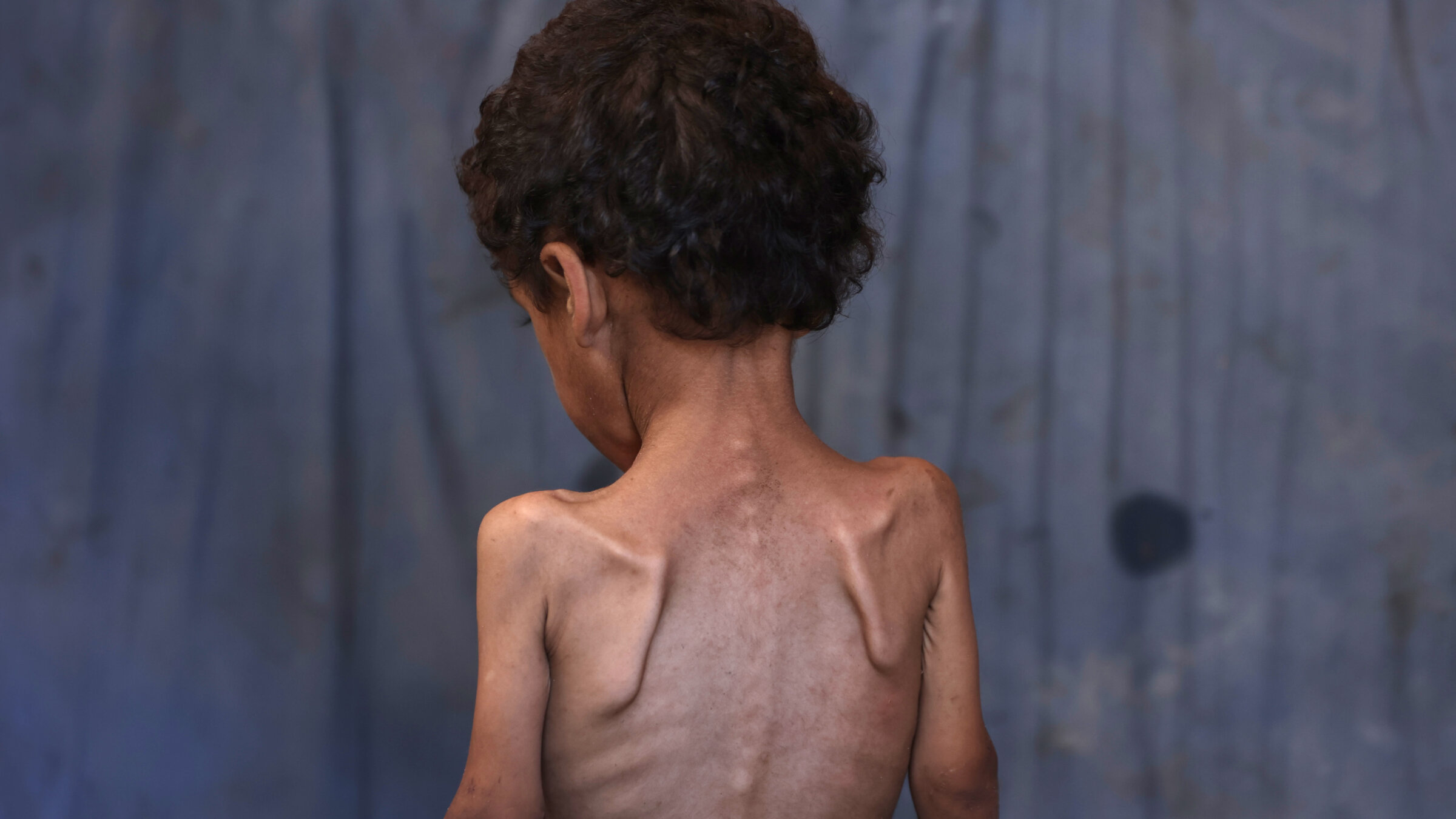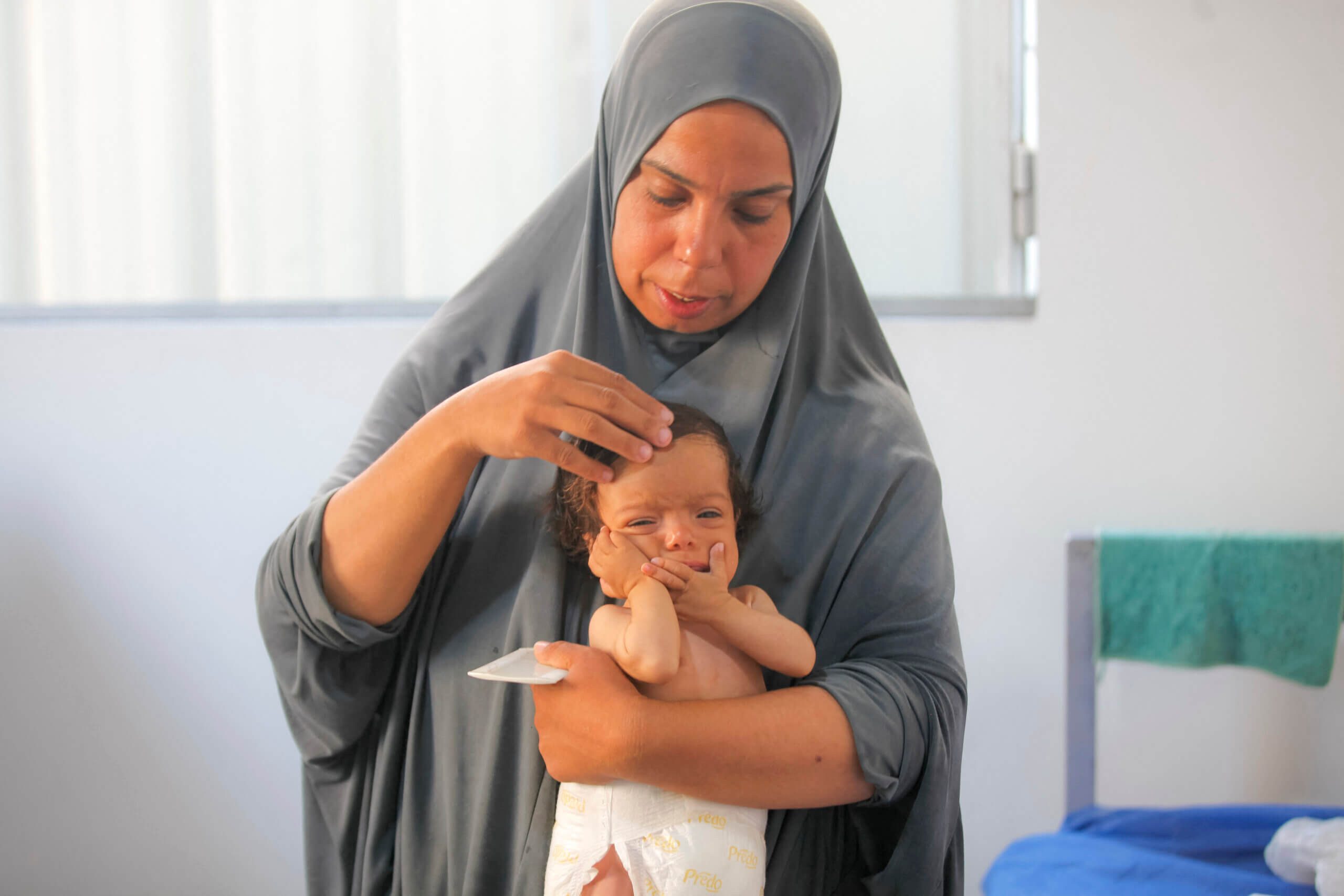Gaza is starving. Where are the American Jewish leaders?
Privately, Jewish lay leaders are anguished over Gaza. Publicly, they fear being labelled antisemitic

Yazan, a malnourished 2-year-old Palestinian boy, stands with his back turned in his family’s damaged home in the Al-Shati refugee camp in Gaza on July 23. Image by Omar Al-Qattaa/AFP via Getty Images
A few days after a Lebanese Christian militia, under the permissive watch of the Israeli army, slaughtered thousands of Palestinian refugees in Beirut in 1982, Rabbi Yehuda Amital of Har Etzion Yeshiva in the West Bank wrote a letter to his students. Deeply distraught, he warned that the event had caused “beyond the moral aspects which cry out to the depths of the heavens — a great chillul hashem [desecration of God] in Israel and among the nations.”
Lambasting the Israeli government’s initial decision to forego a committee of inquiry over the Sabra and Shatila massacre, he accused the government of prioritizing the honor of the prime minister over that of God. Yom Kippur was only days away. “My entire being shakes and trembles out of fear of the Day of Judgment,” Amital added, “for as it is known, for the sin of chillul hashem, even Yom Kippur does not atone.”
Amital’s words echo painfully today as hopes of a ceasefire and hostage deal fade, and as every day brings more horrific scenes of death and starvation in Gaza.
It is time for American Jewry to take an accounting of how many of our communal institutions and leaders are continuing to defend and support a war that has left an unbearable path of death and destruction in its wake.
As current and former high-level security and defense personnel have testified, this war long ago ceased being a war to neutralize Hamas, return the hostages, and protect Israelis, and became a war of revenge and of settlement that serves primarily to hold the government coalition together and keep Netanyahu out of prison. Almost every day, dozens of Palestinians are killed just trying to secure food for themselves and their families. Nearly every week brings news of more young soldiers killed in action.
The longer the war continues, the less likely it becomes that the hostages who have survived until now will return home alive. The vast majority of Israelis want the war to end, and tens of thousands march in the street every week to call for the deal that will end it.
Every person of conscience should be horrified by the death and destruction in Gaza. Nearly two years of war has left more than 56,000 Palestinians dead, including an estimated 17,000 children. Blocks upon blocks of homes and businesses have been obliterated, and virtually the entire population of 2 million is displaced. Nearly 900 Israeli soldiers have been killed, with new casualties just this week. And through it all, Netanyahu has continued his efforts to dismantle Israeli democratic institutions — a cause that before Oct. 7 brought even mainstream American Jews to the streets in protest.
But within the mainstream American Jewish community, one hears little of these horrors. I have attended multiple Jewish community events over the past two years in which speakers reference the atrocities of Oct. 7 and the plight of the hostages without once mentioning the unbearable death toll among Palestinians.
In private, I’ve heard many Jewish leaders and even more Jewish community members acknowledge their horror at what is happening in Gaza and the worsening onslaught of settler violence in the West Bank. Some past communal leaders have spoken up. But in public, most of the current mainstream leadership presents a united front in which no criticism of the Israeli government or military will be tolerated.
Acknowledging any fault by Israel, some argue, only gives fodder to antisemites and haters of Israel. Combined with the dismay at the growing number of young Jews who define themselves as anti-Zionist, many leaders and institutions have simply redoubled efforts to insist on Israel’s righteousness and to shut critical voices out of the Jewish community.
I understand why many Jewish leaders are afraid to express any criticism of Israel’s conduct in this war. The American Jewish community is still reeling from the trauma of Oct. 7, as well as from the responses from some parts of the far left, which included a shocking willingness to glorify the killing and kidnapping of Israelis, mock returned hostages and even distribute Hamas and Hezbollah propaganda. The rise of antisemitism across the world, including the murders at the Capital Jewish Museum and in Boulder, Colorado, has further shaken the Jewish community.
I know from personal experience that Jewish professional leaders fear that any word of criticism will be met with outrage by prominent lay leaders and donors. In December 2023, after T’ruah, the organization I lead, issued a call for negotiations toward a bilateral ceasefire, I began hearing from our members who are rabbis that they had received angry phone calls from significant communal donors. In some cases, the donors threatened to pull institutional support if the rabbis did not drop their membership.

Many of these rabbis told us that they wanted to remain members, but could no longer be public about their affiliation. This imposed silence conveys the message that the majority of the Jewish community agrees with the actions of the Israeli government, even when survey after survey demonstrates that most American Jews both care about Israel and despise its government and its policies.
But our own fear must not distract us from the reality that the biggest threat to Israel, and indeed to Judaism itself, is coming from Israel’s governing coalition. Israel is increasingly becoming an autocratic and theocratic state. This is the moment for American Jews — including both leaders and ordinary Jewish community members — to raise their voice.
As prominent religious Zionist voices in Israel and in the Israeli government celebrate or deny the extreme brutality toward Palestinians, we need strong moral American Jewish leaders. We must demonstrate that love for Israel, the Torah and the Jewish people can and must include advocating for an end to the war and humanitarian relief in Gaza. American Jewish leaders must categorically reject any efforts to expel the population of Gaza or to build Jewish settlements there.
In 1982, as some 400,000 Israelis took to the streets in protest of the Sabra and Shatila massacre, mainstream American Jewish leaders hemmed and hawed. “We reject the idea of any participation or involvement by the Israel Defense Force in this terrible event,” Julius Berman, then-chairman of the Conference of Presidents of Major American Jewish Organizations, told JTA at the time. Charlotte Jacobson, the chair of the World Zionist Organization’s America section, deplored the “trigger-quick eagerness of the world” to blame Israel for the incident.
When the Israeli commission of inquiry ultimately issued its report, it found that Israel held indirect responsibility for the massacre and that then-defense minister Ariel Sharon held personal responsibility. Nearly 50 years have passed since Sabra and Shatila. Israel is not immune from extremism, war crimes or autocracy. Yet a fear of being labelled antisemitic still deters American Jews and Jewish institutions from taking a position that is not only morally correct, but also the best way to advance love and concern for the Jewish state and its people.
“God’s name is being desecrated through our sins,” Rabbi Amital wrote nearly five decades ago. “Is it possible to remain silent?!” Today, his challenge tragically rings just as true.















